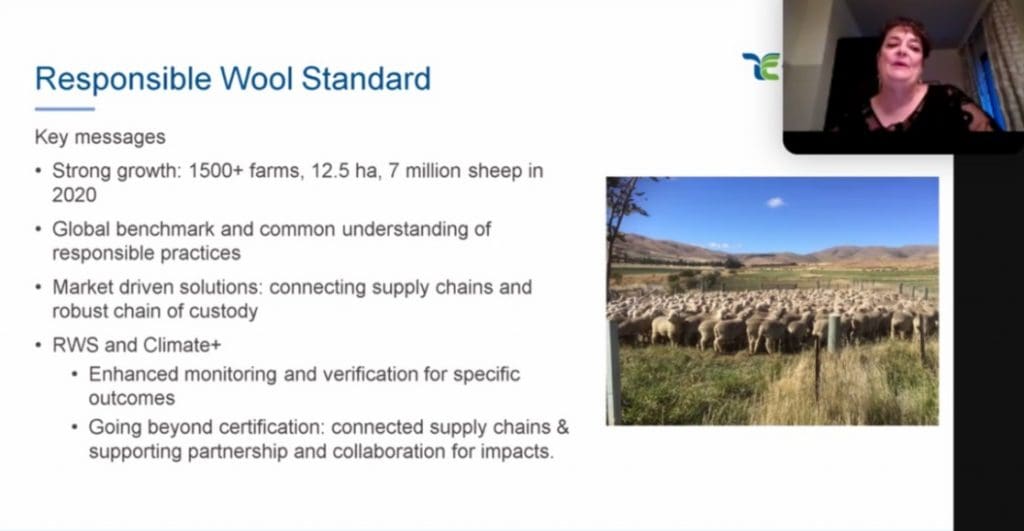
Textile Exchange managing director La Rhea Pepper presents at the Wool Connect conference
WOOL Connect conference participants were told strong market signals and grower education were needed to increase Responsible Wool Standard uptake in Australia.
The Responsible Wool Standard is one of the most prominent and well-known accreditation systems for the sourcing of non-mulesed wool and is gaining acceptance among Australian growers, brokers and exporters.
Textile Exchange co-founder and managing director La Rhea Pepper told the virtual conference that that the exchange had 642 members and more than 2400 participants across 11 ‘roundtables’.
She said the exchange was now using the term “connected action” to have aligned strategies to transform from being “islands of good to this force for change.”
More than 200 brands that report fibre and material use to the exchange’s benchmarking program and more than 30,000 ‘sites’ in 82 countries were certified in TE fibre standards to identify and support best practices.

Schneider Group director Elena Schneider
Schneider Group director Elena Schneider welcomed conference participants and said the company would celebrate its centenary next year.
She said the clothes we wear “not only must be fancy and comfortable, but also responsible.”
“And if there is a slow food movement against fast food, there should a slow fashion (movement) against fast fashion,” she said.
“The way we consume makes a difference.”
“The aim should be to increase the consumption of wool and other natural fibres against synthetics, which cause, we know, the terrible problem of microplastics,’ she said.
“We want to ensure a better future for all of us.”
Market access, training and information needed for RWS growth
When asked what is the main limiting factor to the uptake of RWS in Australia, Ms Pepper said there were two primary barriers to RWS growth in any region.
“One is you can’t adopt some of these more responsible practices on a maybe, you have to have market access, and it is about strong market signals.
“So I think the primary barrier here is getting commitments from brands and retailers to make sure that they are supporting the farmers in their region for the type of wool that they are needing,” she said.
“So I think part of it is the barrier of market access, the other is training and access to information and ‘here is this opportunity for farmers and ranchers.
“So it is this kind of double edge piece, you’ve got to have both: the market access in order for opening up that direction of travel, as well as training and the farmers understanding the opportunity that’s there.”
Ms Pepper was also asked why the Textile Exchange was promoting recycled polyester fibre, as it would lead to micro-poly fibres ending up in waste water.
“Yes, it is a huge challenge and when we are working across the portfolio of fibres, the choice is virgin polyester or moving the industry away from the status quo into some preferred solutions.
“Microfibres are a significant issue and we are working with other groups that tell that story and it is a challenge, and as a Textile Exchange we do our best not to compare one fibre against another, but promote best in class,” she said.
“Saying that, I’m a farmer and I have a preference for land-based fibres, so I think that lense of climate and mitigating risk is going to add another plus in the reasons why you should adopt natural land-based fibres.
“We all wear different fibres and form follows function, so it is about function and hopefully we can increase the use of natural fibres over time.”
FOUR PAWS to present brands ‘letter of intent’
Global animal welfare body FOUR PAWS will again call for an end to mulesing in the wool industry during the Wool Connect conference tonight.
FOUR PAWS wool campaigner Rebecca Picallo Gil will present an open letter signed by more than 30 global fashion brands, including Adidas, Patagonia and H&M.
FOUR PAWS said its goal is a concrete action plan to eliminate mulesing by 2030.
The animal welfare body said Adidas, H&M Group, Bestseller, VF Corporation, Mammut, Patagonia, and Otto Group have a brand Letter of Intent, stating they do not want mulesed wool and calling on the Australian wool industry to enable the transition away from mulesing and towards pain-free alternatives.
“The FOUR PAWS ‘Brand Letter of Intent’ is another strong signal to the Australian wool industry and global wool supply chains that mulesing must become a thing of the past,” Ms Picallo Gil said.
FOUR PAWS said Australian Wool Innovation has mentioned an end to mulesing by 2030 in its newest paper Wool Strategy 2030, setting its own goal for wool growers to have the “confidence and tools to manage flystrike without mulesing” by 2030.
“This was an important step showing that the wool industry in Australia recognises that time is running out for mulesing,” Ms Picallo Gil said.
“What must be developed next is a clear action plan for wool growers and textile brands to phase-out mulesing.
“That is why we want to use the momentum of this ‘Brand Letter of Intent’ to confirm to AWI that the brands are ready, and need their counterparts in Australia to develop an action plan to fulfill the common goal to end mulesing by 2030,” she said.
Click here to review FOUR PAWS’ Brand Letter of Intent.
The Wool Connect conference continues tonight and tomorrow night.
Do you have anything to say about this?
Have you signed on to RWS or another wool integrity scheme and why? Or why haven’t you? And are you comfortable working in a wool market influenced by the customers of the brands and retailers, and the philosophies of animal welfare bodies? Please share your views with other Sheep Central readers in the comment section below.

From a commercial sheep breeder’s position, mulesing is not an issue. The work has and is being done by seedstock suppliers all over Australia, with most being non-mulesed since 2004.
Having gone the pathway of producing a sheep that does not need mulesing, we have also eliminated body strike and chemical use. In addition, this type of Merino is highly fertile rearing large numbers of lambs.
A great step forward by AWI. Congratulations. There is certainly plenty of genetics available to take the national Merino flock to a mules-free blowfly resistant Merino.